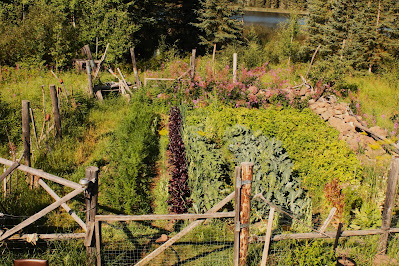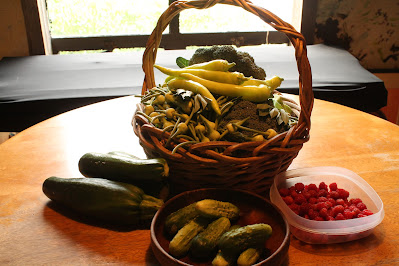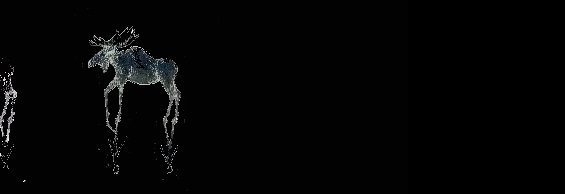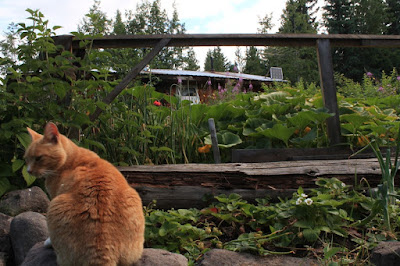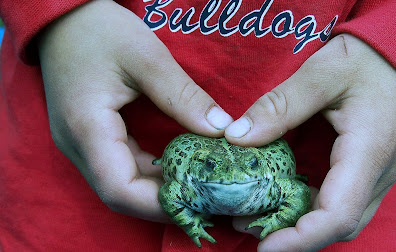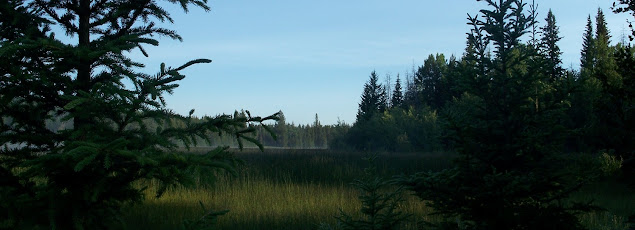Two Massachusetts writers who have had an impact on our lives here here.
The potato patch.
It
wasn't until Aki and I moved into the bush in '97, started to make
hunting and survival knives that we learned of George Sears (pen name
Nessmuk), his methods, bushcraft skills and the famed design, the
"Nessmuk" knife.
"Go light, the lighter the better".
We've sold many bushcraft knives fashioned after George Sears Nessmuk knife design. In total a few years of living here.
We read Henry Thoreau. He writes of freedom. 40 years later we're still reading. Testaments on freedom. Holding his
belief in life close.... we persevere. We read his work aloud. Always
amazed at how pertinent his insights remain.
Starting the green house with lots of greens. They go to flower and the bees come.
Before
After
Bees are amazing. Privileged to work with them.
Bumble bee and mustard.
"I
went to the woods because I wished to live deliberately, to front only
the essential facts of life, and see if I could not learn what it had to
teach, and not, when I came to die, discover that I had not lived".
Henry David Thoreau
Aki sun dries, freezes, sauces and cans. We eat a lot of tomatoes.
Peas, Aki and fireweed.
Fireweed and rocks.
"We do not go to the green
woods and crystal waters to rough it, we go to smooth it. We get it
rough enough at home, in towns and cities".
George Sears, Nessmuk.
Lots of rain this year. We lost our lakeside garden to the lake.
Salad Greens.
I viewed Thoreau's ideas as my own. It only made sense to me.
Living simply. Living with a light footprint. Feeding ourselves with the food we
grow.
So we live by isolation in the boreal forest while the world changes.
It
felt serendipitous, a few years ago we made a connection. George Sears
was born in 1820 at what is now Webster, Massachusetts. Less than 100
kms away from where Thoreau was born in Concord, Massachusetts in 1817. They grew up at the same time and essentially the same place. They were neighbours.
Photographs by Aki Yamamoto
Thoreau, July 12, 1817 – May 6, 1862, was a an essayist, poet and philosopher. He was a transcendentalist. Thoreau wrote a book Walden which we have our son reading outloud to us these days when people are following rules and avoiding each other.
"Thoreau's books, articles, essays, journals, and poetry amount to more than 20 volumes. Among his lasting contributions are his writings on natural history and philosophy, in which he anticipated the methods and findings of ecology and environmental history, two sources of modern-day environmentalism. His literary style interweaves close observation of nature, personal experience, pointed rhetoric, symbolic meanings, and historical lore, while displaying a poetic sensibility, philosophical austerity, and attention to practical detail.[5]
He was also deeply interested in the idea of survival in the face of
hostile elements, historical change, and natural decay; at the same time
he advocated abandoning waste and illusion in order to discover life's true essential needs.[5]
He was a lifelong abolitionist, delivering lectures that attacked the Fugitive Slave Law while praising the writings of Wendell Phillips and defending the abolitionist John Brown. Thoreau's philosophy of civil disobedience later influenced the political thoughts and actions of such notable figures as Leo Tolstoy, Mahatma Gandhi, and Martin Luther King Jr.[6]
Thoreau is sometimes referred to as an anarchist.[7][8]
Though "Civil Disobedience" seems to call for improving rather than
abolishing government—"I ask for, not at once no government, but at once a better government"[9]—the
direction of this improvement contrarily points toward anarchism:
"'That government is best which governs not at all;' and when men are
prepared for it, that will be the kind of government which they will
have".
(I copied this from Wikipedia only to give a little insight into Thoreau)
Aki and Scott
www.caribooblades.com
I went to the woods
because I wished to live deliberately, to front only the essential facts
of life, and see if I could not learn what it had to teach, and not,
when I came to die, discover that I had not lived.
Henry David Thoreau
Read more at https://www.brainyquote.com/authors/henry-david-thoreau-quotes
I went to the woods
because I wished to live deliberately, to front only the essential facts
of life, and see if I could not learn what it had to teach, and not,
when I came to die, discover that I had not lived.
Henry David Thoreau
Read more at https://www.brainyquote.com/authors/henry-david-thoreau-quotes
I went to the woods
because I wished to live deliberately, to front only the essential facts
of life, and see if I could not learn what it had to teach, and not,
when I came to die, discover that I had not lived.
Henry David Thoreau
Read more at https://www.brainyquote.com/authors/henry-david-thoreau-quotes
I went to the woods
because I wished to live deliberately, to front only the essential facts
of life, and see if I could not learn what it had to teach, and not,
when I came to die, discover that I had not lived.
Henry David Thoreau
Read more at https://www.brainyquote.com/authors/henry-david-thoreau-quotes







